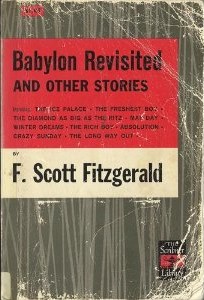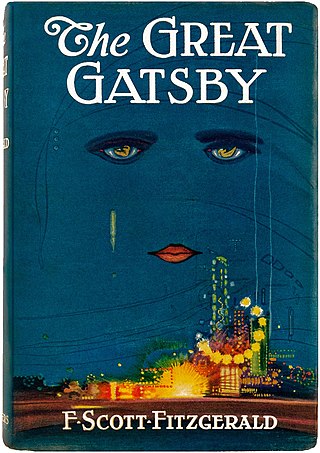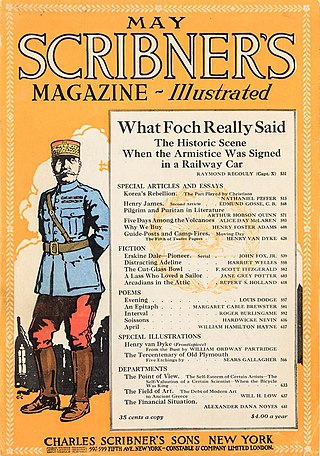
Babylon Revisited and Other Stories is a collection of ten short stories written between 1920 and 1937 by F. Scott Fitzgerald. It was published in 1960 by Charles Scribner's Sons.

Babylon Revisited and Other Stories is a collection of ten short stories written between 1920 and 1937 by F. Scott Fitzgerald. It was published in 1960 by Charles Scribner's Sons.
Babylon Revisited collects ten of F. Scott Fitzgerald's best-known short stories. In an afterword to the 1996 edition, Fitzgerald scholar Matthew Bruccoli describes the period leading up to the selection, "F. Scott Fitzgerald died believing himself a failure. The obituaries were condescending, and he seemed destined for literary obscurity. The first phase of the Fitzgerald resurrection—'revival' does not properly describe the process—occurred between 1945 and 1950. By 1960 he had achieved a secure place among America's enduring writers." [1] In an afterword to the 2000 edition, James L. W. West III of Pennsylvania State University explains of the Babylon Revisited stories, "His writings embody lessons of ambition and disappointment, idealism and disenchantment, success and failure and redemption, that are central to the American experience...His romantic readiness for life and his gift for hope have come to embody important aspects of the American experience." [2]
The ten stories included are
When the title story appeared in Fitzgerald's final collection, 1935's Taps at Reveille , The New York Times wrote "'Babylon Revisited', which seems oddly linked in spirit to Mr. Fitzgerald's latest novel, Tender is the Night , is probably the most mature and substantial story in the book. A rueful, though incompleted, farewell to the Jazz Age, its setting is Paris and its tone one of anguish for past follies." [3] In a January 2011 essay to commemorate the 50th anniversary of the Penguin's Modern Classics series, University of East Anglia's Sarah Churchwell wrote
"Babylon Revisited" is at once timeless and startlingly modern in its evocation of a single father struggling with alcoholism and trying to care for his daughter, and coming to terms with the costs of extravagance...Nine years after the publication, less than a year before he would die at 44, Fitzgerald wrote his daughter Scottie a letter about the story: "You have earned some money for me this week because I sold 'Babylon Revisited', in which you are a character, to the pictures (the sum received wasn’t worthy of the magnificent story—neither of you nor of me—however, I am accepting it)." Like [the story's hero], Fitzgerald learnt the hard way that loss is remorseless, absolute; what has been wasted is irrecoverable. But as "Babylon Revisited" also shows, even out of the wreckage some things can be salvaged, if not everything: what Fitzgerald retrieved he bequeathed to us, the hard-won lessons of his life transformed into heartbreaking art.
Churchwell called the story—as of 2011—"a perfect tale for the times we live in". [4]
Betty Draper can be seen reading the collection in the second season of Mad Men .

The Great Gatsby is a 1925 novel by American writer F. Scott Fitzgerald. Set in the Jazz Age on Long Island, near New York City, the novel depicts first-person narrator Nick Carraway's interactions with Jay Gatsby, the mysterious millionaire with an obsession to reunite with his former lover, Daisy Buchanan.

Zelda Fitzgerald was an American novelist, painter, and socialite. Born in Montgomery, Alabama, to a wealthy Southern family, she became locally famous for her beauty and high spirits. In 1920, she married writer F. Scott Fitzgerald after the popular success of his debut novel, This Side of Paradise. The novel catapulted the young couple into the public eye, and she became known in the national press as the first American flapper. Because of their wild antics and incessant partying, she and her husband became regarded in the newspapers as the enfants terribles of the Jazz Age. Alleged infidelity and bitter recriminations soon undermined their marriage. After Zelda traveled abroad to Europe, her mental health deteriorated, and she had suicidal and homicidal tendencies, which required psychiatric care. Her doctors diagnosed her with schizophrenia, although later posthumous diagnoses posit bipolar disorder.

The Short Stories of F. Scott Fitzgerald is a compilation of 43 short stories by F. Scott Fitzgerald. It was edited by Matthew J. Bruccoli and published by Charles Scribner's Sons in 1989. It begins with a foreword by Charles Scribner II and a preface written by Bruccoli, after which the stories follow in chronological order of publication.

Flappers and Philosophers is a collection of eight short stories by American writer F. Scott Fitzgerald, published in 1920 by Charles Scribner's Sons. Each of the stories had originally appeared, independently, in either The Saturday Evening Post,Scribner's Magazine, or The Smart Set.

"The Cut-Glass Bowl" is a short story by American author F. Scott Fitzgerald, first published in the May 1920 issue of Scribner's Magazine, and included later that year in his first short story collection Flappers and Philosophers. The story follows the lives of a married couple, Evylyn and Harold Piper, through various difficult or tragic events that involve a cut glass bowl they received as a wedding gift. In a copy of Flappers and Philosophers which he gave to literary critic H. L. Mencken, Fitzgerald wrote that he deemed the story to be "worth reading" in contrast to others in the volume which he dismissed as either "amusing" or "trash."

"Winter Dreams" is a short story by F. Scott Fitzgerald first published in Metropolitan magazine in December 1922 and collected in All the Sad Young Men in 1926. The plot concerns the attempts by a young Midwestern man to win the affection of an upper-class socialite. Frequently anthologized, the story is regarded as one of Fitzgerald's finest works for evoking "the loss of youthful illusions."

"The Ice Palace" is a modernist short story written by F. Scott Fitzgerald and published in The Saturday Evening Post on May 22, 1920. It is one of eight short stories originally published in Fitzgerald's first collection, Flappers and Philosophers, and is also included in the collection Babylon Revisited and Other Stories.

Francis Scott Key Fitzgerald, widely known simply as Scott Fitzgerald, was an American novelist, essayist, and short story writer. He is best known for his novels depicting the flamboyance and excess of the Jazz Age, a term he popularized in his short story collection Tales of the Jazz Age. During his lifetime, he published four novels, four story collections, and 164 short stories. Although he achieved temporary popular success and fortune in the 1920s, Fitzgerald received critical acclaim only after his death and is now widely regarded as one of the greatest American writers of the 20th century.

Ginevra King Pirie was an American socialite and heiress. As one of the self-proclaimed "Big Four" debutantes of Chicago during World War I, King inspired many characters in the novels and short stories of Jazz Age writer F. Scott Fitzgerald; in particular, the character of Daisy Buchanan in The Great Gatsby. A 16-year-old King met an 18-year-old Fitzgerald at a sledding party in Saint Paul, Minnesota, and they shared a passionate romance from 1915 to 1917.

All the Sad Young Men is a collection of short fiction by American writer F. Scott Fitzgerald. The stories originally appeared independently in popular literary journals and were first collected in February 1926 by Charles Scribner's Sons.

Taps at Reveille is a collection of 18 short stories by American writer F. Scott Fitzgerald, published by Charles Scribner's Sons in 1935. It was the fourth and final volume of previously uncollected short stories Fitzgerald published in his lifetime. The volume appeared a year after his novel Tender is the Night was published. The collection includes several stories featuring autobiographical creations derived from Fitzgerald's youth, namely Basil Duke Lee and Josephine Perry.
The Bridal Party is a short story written by F. Scott Fitzgerald and featured in the Saturday Evening Post on August 9, 1930. The story is based on Ludlow Fowler's brother, Powell Fowler, May 1930 Paris wedding. It is Fitzgerald's first story dealing with the stock market crash and celebrates the end of the period when wealthy Americans colonized Paris.
"The Freshest Boy" is a short story by American writer F. Scott Fitzgerald. It was first published in the July 28, 1928 issue of The Saturday Evening Post, and was reprinted in Fitzgerald's 1935 collection, Taps at Reveille.

The Basil and Josephine Stories is a collection of two separate short stories collections by F. Scott Fitzgerald which initially ran serially in The Saturday Evening Post. Some of them were later collected in Taps at Reveille and posthumous short story collections. The title characters were intended by Fitzgerald to meet each other, but this never happened in his literature. Basil Duke Lee, who was a fictionalized version of F. Scott Fitzgerald's younger self. Scott draws from his own experiences as a child and an adolescent.
"First Blood" is a short story by F. Scott Fitzgerald, originally published in the April 5, 1930 issue of The Saturday Evening Post, illustrated by Harry Russell Ballinger. It was later included in his 1935 short story collection Taps at Reveille.

"Babylon Revisited" is a short story by F. Scott Fitzgerald, written in 1930 and first published on February 21, 1931 in the Saturday Evening Post and free inside The Telegraph, the following Saturday.

"The Rich Boy" is a short story by American writer F. Scott Fitzgerald. It was included in his 1926 collection All the Sad Young Men. "The Rich Boy" originally appeared in two parts, in the January and February 1926 issues of Redbook. In the January installment, the story is described on the front cover as: "A great story of today's youth by F. Scott Fitzgerald".

Francis Scott Key Fitzgerald was an American author of novels and short stories, whose works are the paradigmatic writings of the Jazz Age. He is widely regarded as one of the greatest American writers of the 20th century. Fitzgerald is considered a member of the "Lost Generation" of the 1920s. He finished four novels: This Side of Paradise, The Beautiful and Damned, The Great Gatsby, and Tender Is the Night. A fifth, unfinished novel, The Last Tycoon, was published posthumously. Fitzgerald also wrote many short stories that treat themes of youth and promise along with age and despair.
Sarah Bartlett Churchwell is a professor of American Literature and Public Understanding of the Humanities at the School of Advanced Study, University of London, UK. Her expertise is in 20th- and 21st-century American literature and cultural history, especially the 1920s and 1930s. She has appeared on British television and radio and has been a judge for the Booker Prize, the Baillie Gifford Prize, the Women's Prize for Fiction, and the David Cohen Prize for Literature. She is the director of the Being Human festival and the author of three books: The Many Lives of Marilyn Monroe; Careless People: Murder, Mayhem and the Invention of The Great Gatsby; and Behold America: A History of America First and the American Dream. In April 2021, she was long listed for the Orwell Prize for Journalism.
"The Adjuster" is a short story written by American author F. Scott Fitzgerald. The story appears in Fitzgerald's third collection of short stories All the Sad Young Men, published by Scribners in February 1926. The story depicts the troubled relationship of married couple Luella and Charles Hemple, living in New York City in 1925.